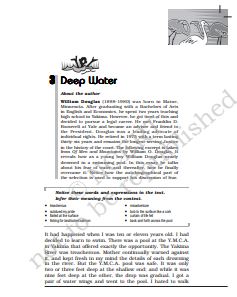‘NCERT Solutions for Class 12 English Chapter 3‘ PDF Quick download link is given at the bottom of this article. You can see the PDF demo, size of the PDF, page numbers, and direct download Free PDF of ‘Ncert Class 12 English Chapter 3 Exercise Solution’ using the download button.
NCERT Class 12 English Textbook Chapter 3 With Answer PDF Free Download

Chapter 3: Deep Water
It had happened when I was ten or eleven years old. I had decided to learn to swim. There was a pool at the Y.M.C.A. in Yakima that offered exactly the opportunity.
The Yakima River was treacherous. Mother continually warned against it and kept fresh in my mind the details of each drowning in the river. But the Y.M.C.A. pool was safe.
It was only two or three feet deep at the shallow end; and while it was nine feet deep at the other, the drop was gradual.
I got a pair of water wings and went to the pool. I hated to walk naked into it and show my skinny legs. But I subdued my pride and did it.
From the beginning, however, I had an aversion to the water when I was in it. This started when I was three or four years old and my father took me to the beach in California.
He and I stood together in the surf. I hung on to him, yet the waves knocked me down and swept over me. I was buried in water.
My breath was gone. I was frightened. Father laughed, but there was terror in my heart at the
overpowering force of the waves. My introduction to the Y.M.CA. swimming pool revived unpleasant memories and stirred childish fears. But in a little while, I gathered confidence.
I paddled with my new water wings, watching the other boys and trying to learn by aping them. I did this two or three times on different days and was just beginning to feel at ease in the water
when the misadventure happened.
| Author | NCERT |
| Language | English |
| No. of Pages | 9 |
| PDF Size | 240 KB |
| Category | English |
| Source/Credits | ncert.nic.in |
NCERT Solutions Class 12 English Chapter 3 Deep Water
1. How does Douglas make clear to the reader the sense of panic that gripped him as he almost drowned? Describe the details that have made the description vivid.
Answer:
Douglas conveys to the reader the panic that gripped him as he nearly drowned. When he was learning to swim at the Y.M.C.A. pool, he had a “misadventure.” A well-built boy threw him into the pool. Despite his fear, Douglas was confident that he would emerge from the pool.
He intended to make a big jump as soon as his feet touched the bottom of the pool, rise to the surface, and paddle to the pool’s edge.
The pool was only 9 feet deep, but Douglas believed it to be 90 feet deep. When his feet hit the bottom, he tried jumping with all his might, but the effort was in vain. He began searching for rope, a ladder, and water wings. All he could see was yellowish water all around him.
He was dying of suffocation. He tried to yell, but nothing came out of his mouth. His eyes and nose emerged from the water, but his mouth did not.
Douglas flailed at the water’s surface. His legs stiffened and became paralyzed. He had begun his long journey back to the pool’s bottom.
His lungs and legs were both throbbing with pain. He began to feel dizzy. He couldn’t move his legs or arms. He shook with fear. He wished he could call for assistance, but he was unable to do so.
2. How did Douglas overcome his fear of water?
Answer:
Douglas was determined to overcome his fear of water because it was preventing him from enjoying the pleasures of boating, fishing, and canoeing.
For months, he attended swimming lessons. The instructor required him to put in a lot of practice time. He learned a variety of swimming techniques. Every day, he practiced for hours. After taking those swimming lessons, he felt a little less afraid.
Douglas hadn’t finished his swimming lessons yet. He went to various lakes to practice his swimming skills. He swam from one shore to the other without assistance.
3. Why does Douglas as an adult recount a childhood experience of terror and his conquering of it? What larger meaning does he draw from this experience?
Answer:
Douglas, as an adult, recounts a childhood terror experience and his triumph over it because the experience had a deep meaning for him.
He’d been through a terrifying ordeal and emerged victoriously. The larger meaning, he derived from his experience is that terror exists only in the fear of death, as Roosevelt once stated, “all we have to fear is the fear itself.”
Douglas had felt both the sensation of death and the terror that it can elicit; his desire to live had grown stronger.
Deep Water NCERT Textbook With Solutions PDF Free Download
